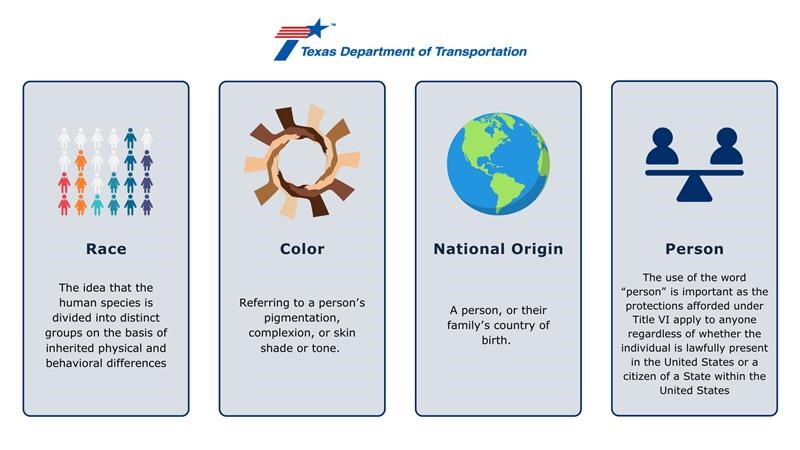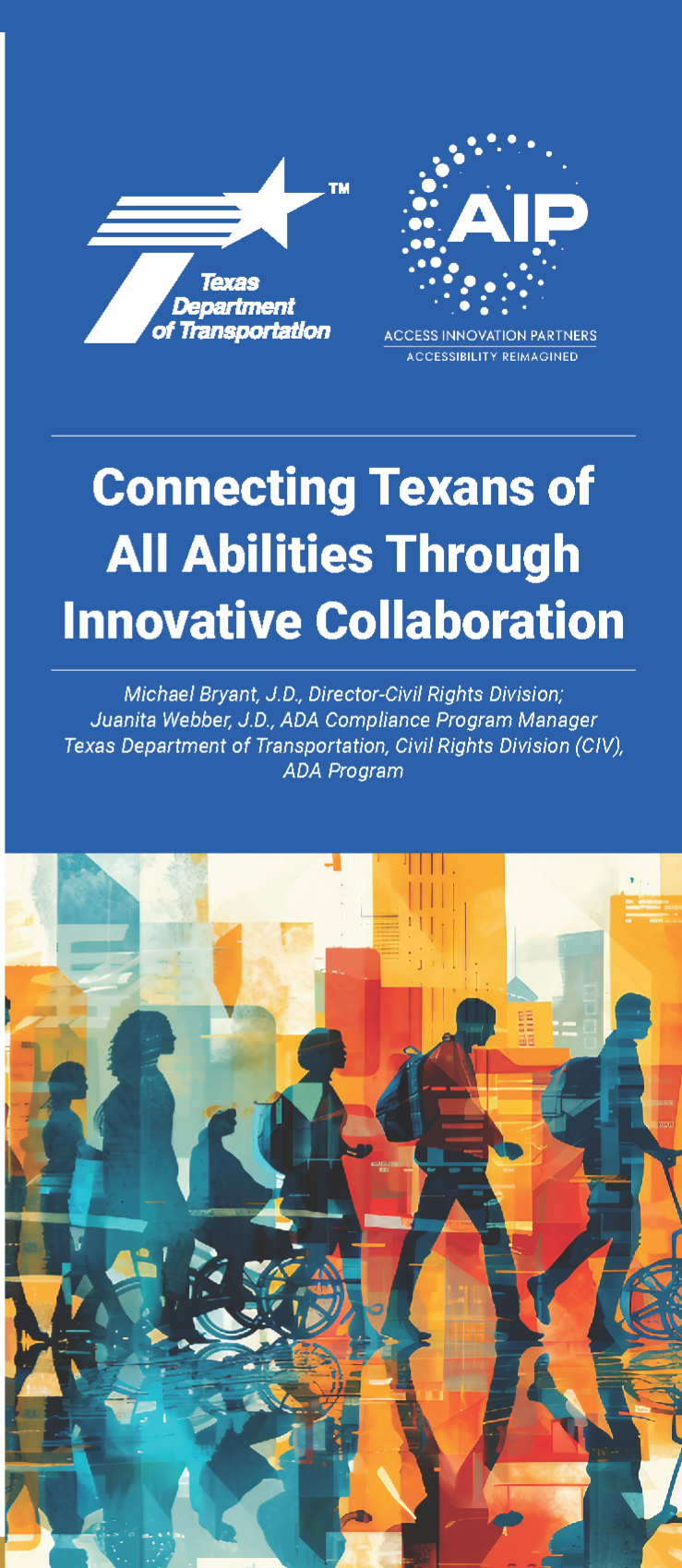YEG Open House - meet the Civil Rights Division
The Civil Rights Division promotes compliance with federal and state regulations related to equal opportunity and non-discrimination, and oversees the Disadvantaged Business Enterprise, Small Business Enterprise, and Historically Underutilized Business programs and activities.
Accessibility: Americans with Disabilities Act (ADA)
Ensuring access to civic life for people with disabilities is a core goal of the ADA. TxDOT’s ADA program spans all services and facilities—not just highway construction. The Department continues to expand outreach to local agencies, advocacy groups, and civil rights programs to raise awareness of ADA-related services. CIV regularly meets with District and Division ADA liaisons to provide training and resources, increasing awareness of ADA requirements across all programs.
CIV has also updated TxDOT’s ADA Transition Plan, which identifies accessibility deficiencies and helps prioritize projects and allocate resources to address them.
Our ADA Program's most recent innovation is the TxDOT Accessibility Management Enterprise System (TAMES), a solution for streamlining asset evaluation and remediation of the $1.6 billion in identified barriers. Serving as a best practice model, TAMES prioritizes projects and enhances feedback processes, impacting Texas communities by assisting decision-making for TxDOT districts, divisions, and federal fund recipients. By replacing manual tracking with smart data organization, TAMES expedites project planning – speeding up work on projects that benefit every community within TxDOT’s system.
Business and Community Engagement (BCE)
CIV provides a statewide, public-facing support network for programs, including small and minority business engagement, workforce development, ADA, and Title VI. The BCE Section connects these resources to communities by attending industry events, hosting workshops, and meeting with local organizations and small businesses to expand access to CIV services.
Title VI/Nondiscrimination program
As a recipient of federal financial assistance, TxDOT must ensure that its planning, contracting, construction, maintenance, design, environmental, research, right of way, and traffic operations do not adversely impact any group based on race, color, or national origin.
TxDOT’s Title VI program also ensures the Department complies with the Limited English Proficiency requirements to provide interpreter or translation services.

Reporting and Data Management
Reporting and Data Management focuses on improving business operations through technology and process reengineering.
The mission is to enhance business improvement via technology and human resources, while the vision aims to optimize data use for accurate reporting. Key goals include automating compliance information collection and implementing data reporting systems. Major active projects involve automation of various data collections and reporting for compliance, with performance indicators set for project completion and staff skill enhancement.
Small Business Development
CIV certifies small, minority, and disadvantaged businesses through the Disadvantaged Business Enterprise (DBE) and Small Business Enterprise (SBE) programs and recommends them for Historically Underutilized Business (HUB) certification. These programs help small businesses access TxDOT contracting opportunities.
CIV also conducts statewide disparity and availability studies to compare the availability and use of small businesses in TxDOT projects. These studies inform the Department’s utilization goals for federally funded work.
Small Business Program Compliance
CIV ensures compliance with DBE and SBE requirements by guiding districts, divisions, and local governments, while also overseeing contracts with utilization goals and addressing contractor concerns. CIV reviews Good Faith Efforts when goals aren’t met.
CIV also administers the HUB program, overseeing procurement activities and reviewing HUB Subcontracting Plans to ensure prime contractors engage qualified HUBs. These efforts support TxDOT’s small and minority business utilization goals.
As part of the DBE program, race-conscious goals are set on eligible projects to promote DBE subcontractor participation. Goals are established monthly for statewide lettings and as needed for other projects, based on factors like funding, project type, size, and DBE availability.
Workforce Innovation
Through the On-the-Job Training (OJT), Connecting Career Pathways (CCP) and Workforce Development and Training Support Services (WDSS) Programs, CIV works with construction firms, public agencies, and community organizations to equip individuals with the skills needed to enter and retain careers in the transportation infrastructure industry.
- TxDOT’s On-the-Job Training (OJT) Program aims to prepare individuals for entry into journey-level positions in highway construction. This program ensures a skilled workforce is available to meet hiring needs, while helping members of all Texas communities build sustainable careers.
- The WDSS Programs connect business, industry, public agencies, and community organizations statewide to address the unique workforce needs within their specific regions of the state. These entities build strong partnerships to understand transportation workforce capacity, identify skills and training gaps, identify challenges to entry and retention, and implement effective training and continuing education opportunities for all Texans.
- CCP aims to collaborate with educators and community stakeholders to promote and support career awareness and exploration activities for K-12 students across the state. The program connects current curriculum and skill-building to transportation career pathways through innovative and interactive materials and learning experiences.
